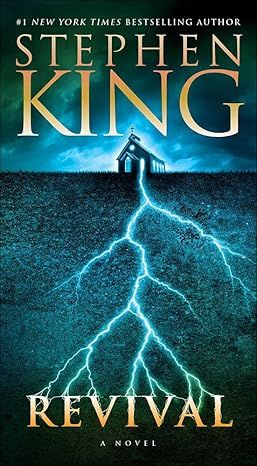Revival
4.2
-
30,758 ratings
Stephen King presents “a fresh adrenaline rush of terror” (People) in this electrifying #1 New York Times bestseller!
The new minister came to Harlow, Maine, when Jamie Morton was a boy doing battle with his toy army men on the front lawn. The young Reverend Charles Jacobs and his beautiful wife brought new life to the local church and captivated their congregation. But with Jamie, he shares a secret obsession—a draw so powerful, it would have profound consequences five decades after the shattering tragedy that turned the preacher against God, and long after his final, scathing sermon. Now Jamie, a nomadic rock guitarist hooked on heroin, meets Charles Jacobs again. And when their bond becomes a pact beyond even the Devil’s devising, Jamie discovers that the word revival has many meanings….
Kindle
$9.99
Available instantly
Audiobook
$0.00
with membership trial
Library Binding
$18.06
Paperback
$5.99
Ships from
Amazon.com
Payment
Secure transaction
ISBN-10
0606408266
ISBN-13
978-0606408264
Print length
480 pages
Language
English
Publisher
Turtleback Books
Publication date
November 27, 2017
Dimensions
4.3 x 1.6 x 7.5 inches
Item weight
12.8 ounces
Popular highlights in this book
The three true ages of man are youth, middle age, and how the fuck did I get old so soon?
Highlighted by 1,372 Kindle readers
But writing is a wonderful and terrible thing. It opens deep wells of memory that were previously capped.
Highlighted by 996 Kindle readers
When you want to feel better, call something a piece of shit. It usually works.
Highlighted by 963 Kindle readers
Product details
ASIN :
B00ILHW6AG
File size :
2516 KB
Text-to-speech :
Enabled
Screen reader :
Supported
Enhanced typesetting :
Enabled
X-Ray :
Not Enabled
Word wise :
Enabled
Editorial reviews
“Spellbinding…King is a master at invoking the supernatural through the powerful emotions of his characters, and his depiction of Jacobs as a man unhinged by grief but driven by insatiable scientific curiosity is as believable as it is frightening. The novel’s ending – one of King’s best – stuns like lightning.” ― Publishers Weekly (starred review)
“Stephen King’s splendid new novel offers the atavistic pleasure of drawing closer to a campfire in the dark to hear a tale recounted by someone who knows exactly how to make every listener’s flesh crawl." ― Washington Post
“Revival finds King writing with the infectious glee that has always been at the heart of his popular success… Older and wiser each time he writes, Mr. King has moved on from the physical fear that haunted him after he was struck by a van while out walking to a more metaphysical, universal terror. He writes about things so inevitable that he speaks to us all.” ― The New York Times
“Revival is dark, disquieting and pretty horrifying, revealing a mind (the narrator’s, for sure; King’s, perhaps) searching for answers to life’s age-old questions about life and death.” ― Minneapolis Star Tribune
“Revival is easily his best work in years…fresh…an excellent, simply written story…filled with suspense and curiosity, it’s a one-day read for King fans.” ― Boston Herald
“As the Kingian references pile up, and become layered into the events of the fictional world, you fall deeper and deeper under the story’s spell, almost believing that Jamie’s nightmarish experiences actually happened…reading Revival is experiencing a master storyteller having the time of his life. All of his favorite elements are at play – small town Maine, the supernatural, the evil genius, the obsessive addict, the power of belief to transform a life…it is fun to map it all out, to experience King’s mind at work.” ― New York Times Book Review
“Revival buzzes with allusions to horror classics….Revival gives familiar themes—the relationship between science and religion, the fine line between grief and madness—new power. It’s King in electrifyingly fine form.” ― Tampa Bay Times
“Revival is among King’s very best…tender, moving and terrifying.” ― New York Daily News
“It’s a good, scary story, but it’s so much more. Every page is a treasure trove of detail about daily life in America, in the 1960s or whatever decade King’s story lights on. There are tiny stories within stories, and headlines, road signs, soapsuds, state fairs, storefronts … It’s pure poetry.” ― Raleigh News and Observer
“King fans won’t find anything to complain about here. At just over 400 pages it’s one of his quicker reads and any hint of the supernatural is blended with tender moments that ground the characters….If this is your first King novel, it’s not a bad choice. You don’t need to know anything about his oeuvre coming in, and if you like the writing style, there are dozens of other King books you’ll probably enjoy.” ― Associated Press
“Worshippers at the Universal Church of Stephen King have a lot to rejoice about with his latest literary sermon. Revival is a dark and haunting tale about old-time religion and one man's search for a mythic ‘secret electricity.’ At the same time it's an emotional and spectacular coming-of-age tale that spans 50 years of horrific tragedy and human redemption… Revival is often heartfelt, as characters deal with painful loss, and the author invests you wholly in the separate journeys of Jamie and Charlie as they arrive at their inevitable crossroads and a voltaic endgame. Say hallelujah, for the King has risen to the occasion once again.” ― USA Today
“A fresh adrenaline rush of terror from Stephen King…Maine, rock and roll, engaging characters and a pounding build to a grisly end – this is vintage King.” ― People
“This is King’s darkest novel in quite a while… King retains his aw-shucks accessibility and writes about addiction and shattered bones with the insight of personal experience… Revival is a wrestling match between faith and science, and watching King throw himself into that eternal theological debate within the context of a horror novel is fascinating. This is the sort of book he couldn’t have written when he was younger; it’s the work of someone who has lived a long life and experienced its highs and lows.” ― Miami Herald
“All of the elements that have made King the preeminent American horror author come alive in this ultra-creepy tale of love, loss, evil and electricity…. Riveting.” ― Cleveland Plain Dealer
“King continues to point out the unspeakably spooky weirdness that lies on the fringes of ordinary life… No one does psychological terror better than King. Another spine-tingling pleasure for his fans.” ― Kirkus Reviews
“As with most of his work Mr. King excels at capturing the small moments of the real world, the things that are human and common to everyone. This is a world we all know and recognize. It makes the darkness that lies just beyond our perception seem more real as well.” ― Pittsburgh Post Gazette
Read more
Sample
Revival
I
Fifth Business. Skull Mountain. Peaceable Lake.
In one way, at least, our lives really are like movies. The main cast consists of your family and friends. The supporting cast is made up of neighbors, co-workers, teachers, and daily acquaintances. There are also bit players: the supermarket checkout girl with the pretty smile, the friendly bartender at the local watering hole, the guys you work out with at the gym three days a week. And there are thousands of extras—those people who flow through every life like water through a sieve, seen once and never again. The teenager browsing graphic novels at Barnes & Noble, the one you had to slip past (murmuring “Excuse me”) in order to get to the magazines. The woman in the next lane at a stoplight, taking a moment to freshen her lipstick. The mother wiping ice cream off her toddler’s face in a roadside restaurant where you stopped for a quick bite. The vendor who sold you a bag of peanuts at a baseball game.
But sometimes a person who fits none of these categories comes into your life. This is the joker who pops out of the deck at odd intervals over the years, often during a moment of crisis. In the movies this sort of character is known as the fifth business, or the change agent. When he turns up in a film, you know he’s there because the screenwriter put him there. But who is screenwriting our lives? Fate or coincidence? I want to believe it’s the latter. I want that with all my heart and soul. When I think of Charles Jacobs—my fifth business, my change agent, my nemesis—I can’t bear to believe his presence in my life had anything to do with fate. It would mean that all these terrible things—these horrors—were meant to happen. If that is so, then there is no such thing as light, and our belief in it is a foolish illusion. If that is so, we live in darkness like animals in a burrow, or ants deep in their hill.
And not alone.
• • •
Claire gave me an army for my sixth birthday, and on a Saturday in October of 1962 I was gearing up for a major battle.
I came from a big family—four boys, one girl—and as the youngest I always got lots of presents. Claire always gave the best ones. I don’t know if it was because she was the eldest, because she was the only girl, or both. But of all the awesome presents she gave me over the years, that army was by far the best. There were two hundred green plastic soldiers, some with rifles, some with machine guns, a dozen welded to tubelike gadgets she said were mortars. There were also eight trucks and twelve jeeps. Perhaps the coolest thing about the army was the box it came in, a cardboard footlocker in camouflage shades of green and brown, with PROPERTY OF U.S. ARMY stenciled on the front. Below this, Claire had added her own stenciling: JAMIE MORTON, COMMANDER.
That was me.
“I saw an ad for them in the back of one of Terry’s comic books,” she said when I was done screaming with delight. “He didn’t want me to cut it out because he’s a booger—”
“That’s right,” Terry said. He was eight. “I’m a big brother booger.” He made a fork with his first two fingers and plugged his nostrils with them.
“Stop it,” our mother said. “No sibling rivalry on birthdays, please and thank you. Terry, take your fingers out of your nose.”
“Anyway,” Claire said, “I copied the coupon and sent it in. I was afraid it might not come in time, but it did. I’m glad you like it.” And she kissed me on the temple. She always kissed me there. All these years later, I can still feel those soft kisses.
“I love it!” I said, holding the footlocker against my chest. “I’ll love it forever!”
This was after breakfast, which had been blueberry pancakes and bacon, my favorite. We all got our favorite meals on our birthdays, and the presents always came after breakfast, there in the kitchen with its woodstove and long table and our hulk of a washing machine, which was always breaking down.
“Forever for Jamie is, like, five days,” Con said. He was ten, slender (although he bulked up later), and of a scientific bent, even then.
“Nice one, Conrad,” our father said. He was dressed for work in a clean coverall with his name—RICHARD—stitched in gold thread on the left breast pocket. On the right breast it said MORTON FUEL OIL. “I’m impressed.”
“Thanks, Daddy-O.”
“Your silver tongue wins you the opportunity to help your mother clean up breakfast.”
“It’s Andy’s turn!”
“It was Andy’s turn,” Dad said, pouring syrup on the last pancake. “Grab a dishtowel, Silver Tongue. And try not to break anything.”
“You spoil him rotten,” Con said, but he grabbed a dishtowel.
Connie wasn’t entirely wrong about my concept of forever. Five days later, the Operation game Andy gave me was gathering dust bunnies under my bed (some of the body parts were missing, anyway; Andy got it at the Eureka Grange rummage sale for a quarter). So were the jigsaw puzzles Terry gave me. Con himself gave me a ViewMaster, and that lasted a little longer, but it eventually wound up in my closet, never to be seen again.
From Mom and Dad I got clothes, because my birthday falls near the end of August, and that year I was going into first grade. I found new pants and shirts about as exciting as a TV test pattern, but tried to say thanks with enthusiasm. I imagine they saw through that with no trouble; false enthusiasm does not come easily to six-year-olds . . . although, sad to say, it’s a skill most of us learn fairly rapidly. In any case, the clothes were washed in the hulk, hung on the clothesline in the side yard, and finally folded away in my bureau drawers. Where, it’s probably needless to add, they were out of sight and mind until September came and it was time to put them on. I remember there was a sweater that was actually pretty cool—it was brown with yellow stripes. When I wore it I pretended I was a superhero called the Human Wasp: evildoers, beware my sting!
• • •
But Con was wrong about the footlocker with the army inside. I played with those guys day in and day out, usually at the edge of the front yard, where there was a dirt strip between our lawn and Methodist Road, which was itself dirt in those days. With the exception of Route 9 and the two-lane leading to Goat Mountain, where there was a resort for rich people, all the roads in Harlow were dirt back then. I can remember my mother on several occasions weeping about all the dust that got into the house on dry summer days.
Billy Paquette and Al Knowles—my two best friends—played army with me on many afternoons, but on the day Charles Jacobs appeared in my life for the first time, I was on my own. I don’t remember why Billy and Al weren’t with me, but I do remember I was happy to be by myself for a change. For one thing, there was no need to split the army into three divisions. For another—this was more important—I didn’t have to argue with them about whose turn it was to win. In truth, it seemed unfair to me that I should ever have to lose, because they were my soldiers and it was my footlocker.
When I advanced this idea to my mother one hot late-summer day shortly after my birthday, she took me by the shoulders and looked into my eyes, a sure sign that I was about to receive another Lesson in Life. “That it’s-mine business is half the trouble with the world, Jamie. When you play with your friends, the soldiers belong to all of you.”
“Even if we play-fight different sides?”
“Even if. When Billy and Al go home for their dinner and you pack the soldiers back into the box—”
“It’s a footlocker!”
“Right, the footlocker. When you pack them away, they’re yours again. People have many ways to be lousy to one another, as you’ll find out when you’re older, but I think that all bad behavior stems from plain old selfishness. Promise me you’ll never be selfish, kiddo.”
I promised, but I still didn’t like it when Billy and Al won.
• • •
On that day in October of 1962, with the fate of the world dangling by a thread over a small tropical spit of land called Cuba, I was fighting both sides of the battle, which meant I was bound to come out on top. The town grader had been by earlier on Methodist Road (“Moving the rocks around,” my dad always grumbled), and there was plenty of loose dirt. I scraped enough together to make first a hill, then a big hill, and then a very big hill, one that came up almost to my knees. At first I thought of calling it Goat Mountain, but that seemed both unoriginal (the real Goat Mountain was only twelve miles away, after all) and boring. After consideration, I decided to call it Skull Mountain. I even tried to poke a couple of eye-like caves in it with my fingers, but the dirt was dry and the holes kept caving in.
“Oh, well,” I told the plastic soldiers tumbled in their footlocker. “The world is hard and you can’t have everything.” This was one of my father’s favorite sayings, and with five kids to support, I’m sure he had reason to believe it. “They’ll be pretend caves.”
I put half of my army on top of Skull Mountain, where they made a formidable crew. I especially liked the way the mortar guys looked up there. These were the Krauts. The American army I arranged at the edge of the lawn. They got all the jeeps and trucks, because they would look so groovy charging up the steep slope of the mountain. Some would turn over, I was sure, but at least a few of them would make it to the top. And run over the mortar guys, who would scream for mercy. They wouldn’t get it.
“To the death,” I said, setting up the last few of the heroic Americans. “Hitsmer, you are next!”
I was starting them forward, rank by rank—and making comic-book-style machine-gun noises—when a shadow fell over the battlefield. I looked up and saw a guy standing there. He was blocking the afternoon sun, a silhouette surrounded by golden light—a human eclipse.
There was stuff going on; at our house on Saturday afternoons, there always was. Andy and Con were in our long backyard, playing three-flies-six-grounders with a bunch of their friends, shouting and laughing. Claire was up in her room with a couple of her friends, playing records on her Imperial Party-Time turntable: “The Loco-Motion,” “Soldier Boy,” “Palisades Park.” There was hammering from the garage, too, as Terry and our dad worked on the old ’51 Ford Dad called the Road Rocket. Or the Project. Once I heard him call it a piece of shit, a phrase I treasured then and still use now. When you want to feel better, call something a piece of shit. It usually works.
Plenty going on, but at that moment everything seemed to fall still. I know it’s only the sort of illusion caused by a faulty memory (not to mention a suitcase loaded with dark associations), but the recollection is very strong. All of a sudden there were no kids yelling in the backyard, no records playing upstairs, no banging from the garage. Not a single bird singing.
Then the man bent down and the westering sun glared over his shoulder, momentarily blinding me. I raised a hand to shield my eyes.
“Sorry, sorry,” he said, and moved enough so I could look at him without also having to look into the sun. On top he was wearing a black for-church jacket and a black shirt with a notched collar; on the bottom blue jeans and scuffed loafers. It was like he wanted to be two different people at the same time. At the age of six, I put adults into three categories: young grownups, grownups, and old people. This guy was a young grownup. He had his hands on his knees so he could look at the opposing armies.
“Who are you?” I asked.
“Charles Jacobs.” The name was vaguely familiar. He stuck out his hand. I shook it right away, because even at six, I had my manners. All of us did. Mom and Dad saw to that.
“Why are you wearing that collar with the hole in it?”
“Because I’m a minister. When you go to church on Sundays from now on, I’ll be there. And if you go to Thursday-night MYF, I’ll be there, too.”
“Mr. Latoure used to be our minister,” I said, “but he died.”
“I know. I’m sorry.”
“It’s okay, though, because Mom said he didn’t suffer, only went straight to heaven. He didn’t wear a collar like that, though.”
“Because Bill Latoure was a lay preacher. That means he was sort of a volunteer. He kept the church open when there was no one else to do it. That was very good of him.”
“I think my dad knows about you,” I said. “He’s one of the deacons in the church. He gets to take up the collection. He has to take turns with the other deacons, though.”
“Sharing is good,” Jacobs said, and got down on his knees beside me.
“Are you going to pray?” The idea was sort of alarming. Praying was for church and Methodist Youth Fellowship, which my brothers and sister called Thursday Night School. When Mr. Jacobs started it up again, this would be my first year, just like it was my first year at regular school. “If you want to talk with my dad, he’s in the garage with Terry. They’re putting a new clutch in the Road Rocket. Well, my dad is. Terry mostly hands him the tools and watches. He’s eight. I’m six. I think my mom might be on the back porch, watching some guys play three-flies-six-grounders.”
“Which we used to call rollie-bat when I was a kid,” he said, and smiled. It was a nice smile. I liked him right away.
“Yeah?”
“Uh-huh, because you had to hit the bat with the ball after you caught it. What’s your name, son?”
“Jamie Morton. I’m six.”
“So you said.”
“I don’t think anyone ever prayed in our front yard.”
“I’m not going to, either. What I want is a closer look at your armies. Which are the Russians and which are the Americans?”
“Well, these ones on the ground are Americans, sure, but the ones on Skull Mountain are Krauts. The Americans have to take the mountain.”
“Because it’s in the way,” Jacobs said. “Beyond Skull Mountain lies the road to Germany.”
“That’s right! And the head Kraut! Hitsmer!”
“The author of so many evils,” he said.
“Huh?”
“Nothing. Do you mind if I just call the bad guys Germans? ‘Krauts’ seems kind of mean.”
“No, that’s great, Krauts are Germans, and Germans are Krauts. My dad was in the war. Just the last year, though. He fixed trucks in Texas. Were you in the war, Mr. Jacobs?”
“No, I was too young. For Korea, too. How are the Americans going to take that hill, General Morton?”
“Charge it!” I shouted. “Shoot their machine guns! Pow! Budda-budda-budda!” Then, going down way low in my throat: “Takka-takka-takka!”
“A direct attack on the high ground sounds risky, General. If I were you I’d split your troops . . . like so . . .” He moved half of the Americans to the left and half to the right. “That creates a pincers movement, see?” He brought his thumb and forefinger together. “Drive on the objective from both sides.”
“Maybe,” I said. I liked the idea of a head-on attack—lots of bloody action—but Mr. Jacobs’s idea appealed to me, just the same. It was sneaky. Sneaky could be satisfying. “I tried to make some caves, but the dirt’s too dry.”
“So I see.” He poked a finger into Skull Mountain and watched the dirt crumble and bury the hole. He stood up and brushed the knees of his jeans. “I’ve got a little boy who’d probably get a kick out of your soldiers in another year or two.”
“He can play right now, if he wants to.” I was trying not to be selfish. “Where is he?”
“Still in Boston, with his mother. There’s lots of stuff to pack up. They’ll be here Wednesday, I think. Thursday at the latest. But Morrie’s still a little young for soldiers. He’d only pick them up and throw them around.”
“How old is he?”
“Just two.”
“I bet he still pees his pants!” I yelled, and started laughing. It probably wasn’t polite, but I couldn’t help it. Kids peeing their pants was just so funny.
“He does, at that,” Jacobs said, smiling, “but I’m sure he’ll grow out of it. Your father’s in the garage, you say?”
“Yeah.” Now I remembered where I had heard the man’s name before—Mom and Dad at the supper table, talking about the new minister that was coming from Boston. Isn’t he awfully young? my mother had asked. Yes, and his salary will reflect that, my dad replied, and grinned. They talked about him some more, I think, but I didn’t pay any attention. Andy was hogging the mashed potatoes. He always did.
“You try that enfilading maneuver,” he said, starting away.
“Huh?”
“Pincers,” he said, tweezing his thumb and finger together again.
“Oh. Yeah. Great.”
I tried it. It worked pretty good. The Krauts all died. The battle wasn’t what I’d call spectacular, though, so I tried the frontal assault, with trucks and jeeps tumbling off the steep slope of Skull Mountain, plus Krauts tumbling off the back with death cries of despair: “Yaaaahhh!”
Mom, Dad, and Mr. Jacobs sat on the front porch while the battle raged, drinking iced tea and talking about churchy things—in addition to my dad being a deacon, my mom was in the Ladies Auxiliary. Not the boss of it, but the next-to-boss. You should have seen all the fancy hats she had in those days. There must have been a dozen. We were happy then.
Mom called my brothers and sister, along with their friends, to meet the new minister. I started to come, too, but Mr. Jacobs waved me back, telling Mom we’d already met. “Battle on, General!” he called.
I battled on. Con, Andy, and their friends went out back again and played on. Claire and her friends went back upstairs and danced on (although my mother told her to turn the music down, please and thank you). Mr. and Mrs. Morton and the Reverend Jacobs talked on, and for quite awhile. I remember often being surprised at how much adults could yak. It was tiring.
I lost track of them because I was fighting the Battle of Skull Mountain over again in several different ways. In the most satisfying scenario—adapted from Mr. Jacobs’s pincers movement—one part of the American army kept the Germans pinned down from the front while the rest looped around and ambushed the Germans from behind. “Vat is zis?” one of them cried, just before getting shot in the head.
I was starting to get tired of it and was thinking of going in for a slice of cake (if Con and Andy’s friends had left any), when that shadow fell over me and my battlefield again. I looked up and saw Mr. Jacobs, holding a glass of water.
“I borrowed this from your mother. Can I show you something?”
“Sure.”
He knelt down again and poured the water all over the top of Skull Mountain.
“It’s a thunderstorm!” I shouted, and made thunder noises.
“Uh-huh, if you like. With lightning. Now look.” He poked out two of his fingers like devil horns and pushed them into the wet dirt. This time the holes stayed. “Presto,” he said. “Caves.” He took two of the German soldiers and put them inside. “They’ll be tough to root out, General, but I’m sure the Americans will be up to the job.”
“Hey! Thanks!”
“Add more water if it gets crumbly again.”
“I will.”
“And remember to take the glass back to the kitchen when you finish the battle. I don’t want to get in trouble with your mother on my first day in Harlow.”
I promised, and stuck out my hand. “Put er there, Mr. Jacobs.”
He laughed and did so, then walked off down Methodist Road, toward the parsonage where he and his family would live for the next three years, until he got fired. I watched him go, then turned back to Skull Mountain.
Before I could really get going, another shadow fell over the battlefield. This time it was my dad. He took a knee, being careful not to squash any American soldiers. “Well, Jamie, what did you think of our new minister?”
“I like him.”
“So do I. Your mother does, too. He’s very young for the job, and if he’s good, we’ll only be his starter congregation, but I think he’ll do fine. Especially with MYF. Youth calls to youth.”
“Look, Daddy, he showed me how to make caves. You only have to get the dirt wet so it makes kinda almost mud.”
“I see.” He ruffled my hair. “You want to wash up good before supper.” He picked up the glass. “Want me to take this in for you?”
“Yes, please and thank you.”
He took the glass and headed back to the house. I returned to Skull Mountain, only to see that the dirt had dried out again and the caves had collapsed. The soldiers inside had been buried alive. That was okay with me; they were the bad guys, after all.
Read more
About the authors
Stephen King
Stephen King is the author of more than fifty books, all of them worldwide bestsellers. His first crime thriller featuring Bill Hodges, MR MERCEDES, won the Edgar Award for best novel and was shortlisted for the CWA Gold Dagger Award. Both MR MERCEDES and END OF WATCH received the Goodreads Choice Award for the Best Mystery and Thriller of 2014 and 2016 respectively.
King co-wrote the bestselling novel Sleeping Beauties with his son Owen King, and many of King's books have been turned into celebrated films and television series including The Shawshank Redemption, Gerald's Game and It.
King was the recipient of America's prestigious 2014 National Medal of Arts and the 2003 National Book Foundation Medal for distinguished contribution to American Letters. In 2007 he also won the Grand Master Award from the Mystery Writers of America. He lives with his wife Tabitha King in Maine.
Read more
Reviews
Customer reviews
4.2 out of 5
30,758 global ratings
M.J.Lawicki
5
Dark, Imaginative, and Spellbinding. Highly Recommend!
Reviewed in the United States on October 29, 2023
Verified Purchase
As a lifelong fan of Stephen King I finally made time to read his 2014 novel Revival. I’m pleased to relate that America’s greatest storyteller has succeeded once more in crafting a story that is dark, peppered with disturbing imagery, profound, and thought provoking. I will reveal a few minor plot threads in my review below.
The story’s protagonist Jamie Morton meets his new Pastor as an eight year old child in the year 1963. As is the case in many of King’s tales, this one is located within his own state of Maine. The fictional hamlet is Harlow, and within it we are introduced to Jamie’s extended family, a few local personalities, and a charismatic young Pastor named Charles Jacobs. For reasons unknown to us, a peculiar bond is evident between Jamie and his pastor from their first meeting. Their strange relationship is one that will last sixty years—spanning the length of this novel.
A profound tragedy occurs in the beginning of the story that causes the Pastor to abruptly abandon his religion. The Pastor leaves Harlow, Maine- destination unknown.
One interesting aspect of the pastor’s character is his apparent fascination with lightning and electricity. A preoccupation with science may not be unusual among clergy members- but one can sense there is something ‘off’ regarding his tinkering with electricity. What is not apparent in the beginning is that his obsession with lightning and electricity will have adverse consequences later in the story.
The first third of this book is some of the finest writing Stephen King has produced. Readers are swept up into a fascinating and complex story with well developed and relatable characters. The story is peppered with real-life joys and tragedies. I enjoyed reading how Jamie Morton evolved and changed from a shy boy- to awkward teen- to a confident young man in the span of a few years.
Unfortunately, Jamie’s life takes a tragic turn for the worse in his adult life. The drug addiction that began with his musical career is now uncontrollable- rapidly destroying his health. As Jamie nears death, he is somewhat miraculously reintroduced to Pastor Jacobs, now operating a traveling carnival act of his own in Nebraska.
The former Pastor has improved upon his rudimentary experiments with lightning and electricity and incorporated some of them into his carnival act. The reader is led to believe the Pastor is tampering with dangerous and unfathomable forces for some unknown purpose. What is clear by the middle of this story is that the Pastor has abandoned his former religion completely. He uses his harnessed ‘secret electricity’ to cure various people -including Jamie Morton- of their physical afflictions. As is often the case with miraculous cures, everything is not what it seems. Nevertheless, Charles Jacobs performs these miraculous medical feats and develops a modicum of fame and wealth mid story.
One aspect of this novel I enjoyed was the frequent tie-ins or references to Kings other works. The town of Castle Rock is mentioned upon occasion, and the city of Jerusalem’s Lot can be seen from a vantage point atop nearby Goat Mountain. The vampire grimoire ‘De Vermis Mysteriis’ is mentioned by the Pastor. It is unclear whether he has this text of forbidden knowledge in his possession, but I immediately suspected the story was spiraling toward a tragedy when Jacobs mentioned he read from it.
Fans of Stephen King the horror novelist may be disappointed in this novel as much of it seems focused on the grim realities of life associated with the passage of time. Untimely deaths, suicides, drug addiction, and murder are subjects adroitly addressed in Kings masterful prose. Still, I found much of it thought provoking; we always wonder how much our decisions and outcomes in life are affected by fate versus willpower.
In the final thirty pages of Revival Stephen King at last rewards us with his unleashed imagination. I won’t spoil the ending, but I will hint that it meshes Lovecraftian horror with a subtle nod to Mary Shelly’s Frankenstein.
In the end Stephen King ambitiously and convincingly tackles a broad variety of subjects in this well researched novel. The characters all evolve and change commensurate with the passage of time. In the end, with the exception of Pastor Jacobs, all remain identifiable with their original, younger selves. I found some plot threads near the conclusion to be a trifle disappointing as a reader, but I still believe this is a heartfelt and worthwhile read. Five stars for this gem of a novel.
Read more
20 people found this helpful
Greggorio!
5
ITS ELECTRIC!!!!!!!!!!
Reviewed in the United States on October 28, 2016
Verified Purchase
REVIVAL IS ARGUABLY ONE OF STEPHEN KING'S FINEST MOMENTS. Hugely emotional, the book is part memoir, part horror classic, part love story and partially pure literature. And yet its still pure King. The book possesses the classic and phenomenally effective "King link" to the here, and the now that is the magical and mysterious ingredient contained in all of his works that grabs the reader on the opening page and doesn't let go until the end. A pure horror afficianado may well feel peeved at being made to wait until they reach the story's climax for the 'juicy bits'. A horror fan they may be; but a King fan learns many lessons from their master of the macabre; and they learn them very well. And one of these is patience.
The characters are beautifully drawn, essentially, though it comes down to two major players in this fine literary game. The six year old Charles Jacobs, who meets and immediately befriends the town's brand new reverend, who is the story's second main character. It is fair to say 'something happens' to this much liked Man Of God right at the book's opening section, but that would be too much of a corny theft of Mr King's principal story telling tool. And yet it does, and it affects the Preacher Man deeply. SPOILERS prevent me from explaining myself here, but its a shocking twist, and of course its beautifully written and goes a long way to ensuring the reader finds themselves addicted to the story just like the classic King tales of the past.
Stephen King is real. His books are real. His writing is real. There is a quote in page 26 of the kindle version which supports this claim and gifts the reader with the uneducated layman's view of the different denominations of modern day Christianity. And when Mr King moves from the everyday to the suppositions presented by the book, he doesn't leave his lyrical talents at home, either.
I said at the top of this review that the book is part romance, and its true. Its a beautiful coming of age story, with just a hint of sex thrown in to keep the reader interested. And when the relationship in question is finally consummated, it must be said that its portrayed with the maximum amount of class. The writing style used by Mr King, too, is worthy of great praise, presenting the story in pseudo journal form, breaking down relatively long chapters with shortish but highly readable sub-chapters.
It takes a while for the true character of the book to become obvious, but when it does, the true value of the story jumps sky high. Revival by name, its also revival by nature. Mr King once said in his classic IT, "don't f*** with the infinite" and this moral also holds well if it is applied to the contents of REVIVAL.
REVIVAL does not gift the reader with an overly happy ending. SPOILERS. The book is not funny. It is, however, an immensely satisfying, fascinating, horrific, slightly sexy, hugely enjoyable romp from the town of BLISSFUL DOMESTICITY to the village of TOTAL MADNESS. Constant Readers may well find themselves with tears of joy in their eyes as the book comes alive in their bands. I know i did, and they perfectly matched the grin of complete lunacy the crept across my face to keep them company. New residents of King manor may well wonder what the fuss is all about. But read on, and find themselves hooked they will. But how to explain the effect Sai King has on the world? Its simple.
Something happens.
Read more
6 people found this helpful
retta
5
His books are always good!
Reviewed in the United States on June 15, 2024
Verified Purchase
I have three or four discs left but am enjoying this novel very much. It's different from a lot of King's works, but I like it. I think The Stand will always be my favorite, but this one is very good. Nobody develops characters like King does. I really like the character development in this one.
Update after finishing the book: I found it to be a rather unusual mixture of sci-fi and the supernatural, which is a bit of a departure for King. But it was very human, through and through, the characters were believable, the situations were believable. and it made me think about some people's obsessions with things that others don't spend a second thought on. Life, death, religion, the forces of good and evil, right and wrong, the basic needs that motivate us all and propel us through life....definitely worth reading. The protagonist is a very sympathetic, albeit flawed, man, but I think we can all relate to that. It is, in the end, dark and hopeful at the same time. Which, if you really think about it, kind of sums of life and people in a nutshell. It's all a great big paradox, and Stephen King captured that very well.
Read more
Top Stephen King titles
View all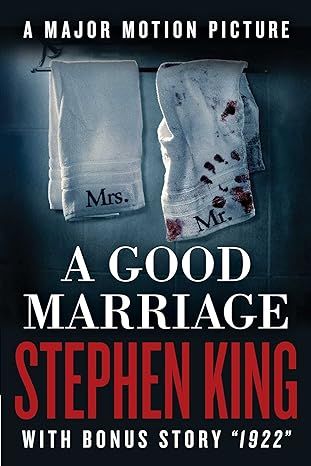
A Good Marriage
4.1
-
5,995
$4.99
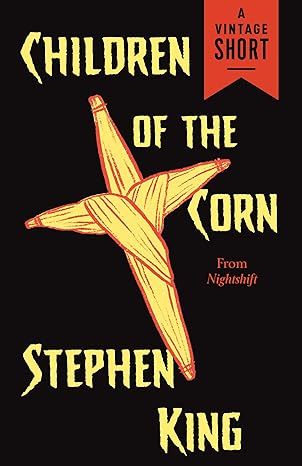
Children of the Corn (Kindle Single) (A Vintage Short)
4.3
-
1,084
$0.99
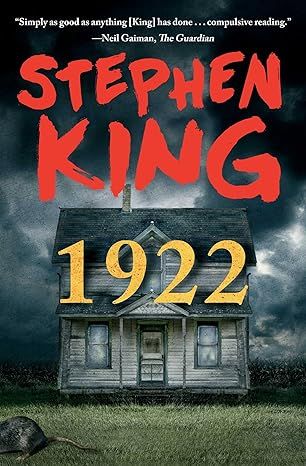
1922
4.6
-
6,082
$7.99
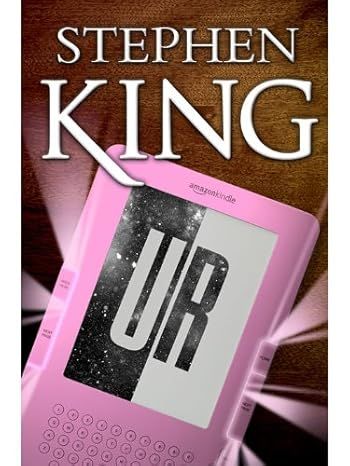
UR
4.3
-
6,140
$3.99
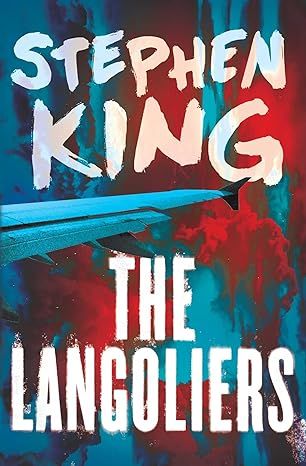
The Langoliers
4.6
-
1,014
$6.49

The Girl Who Loved Tom Gordon: A Novel
4.5
-
4,774
$1.17
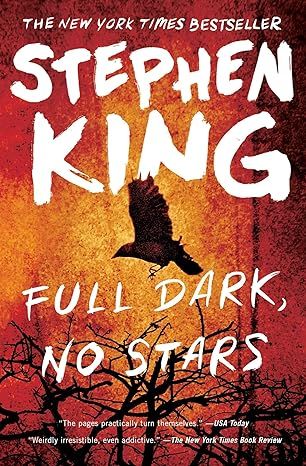
Full Dark, No Stars
4.6
-
6,762
$5.00

Gwendy's Button Box: A Novella (Gwendy's Button Box Trilogy Book 1)
4.5
-
21,335
$3.88
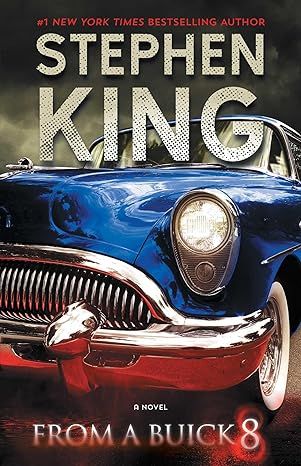
From a Buick 8: A Novel
4.3
-
2,174
$11.99
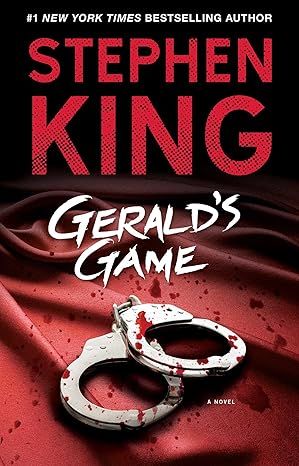
Gerald's Game
4.2
-
3,838
$1.97
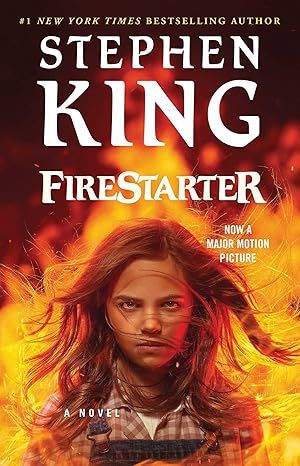
Firestarter
4.6
-
5,489
$9.99
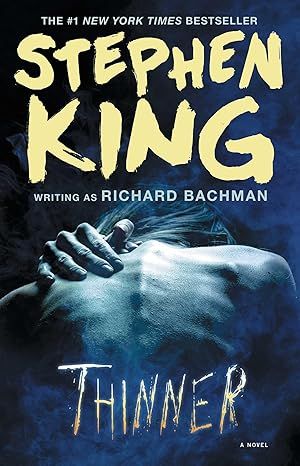
Thinner
4.5
-
3,107
$2.50
Similar Books
Best sellers
View all
The Tuscan Child
4.2
-
100,022
$8.39

The Thursday Murder Club: A Novel (A Thursday Murder Club Mystery)
4.3
-
155,575
$6.33

Sapiens: A Brief History of Humankind
4.6
-
140,302
$13.49

The Butterfly Garden (The Collector, 1)
4.3
-
88,556
$9.59

Things We Hide from the Light (Knockemout Series, 2)
4.4
-
94,890
$11.66

The Last Thing He Told Me: A Novel
4.3
-
154,085
$2.99

The Perfect Marriage: A Completely Gripping Psychological Suspense
4.3
-
143,196
$9.47

The Coworker
4.1
-
80,003
$13.48

First Lie Wins: A Novel (Random House Large Print)
4.3
-
54,062
$14.99

Mile High (Windy City Series Book 1)
4.4
-
59,745
$16.19

Layla
4.2
-
107,613
$8.99

The Locked Door
4.4
-
94,673
$8.53
